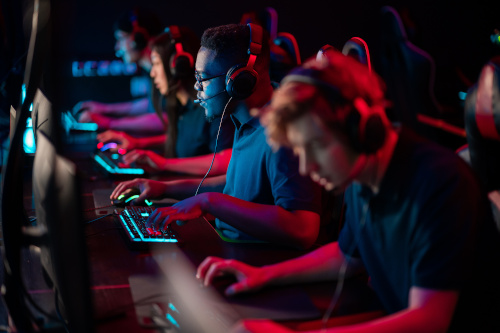You stand, triumphant in front of a crowd cheering your name. After years of dedicated training and countless hours of practice, you’ve made it to the pinnacle of your game, the moment of enjoying the spoils of being a world-class athlete. Just a few months later, the pressure, stress, and injuries due to maintaining that top position have had a severe impact on your mental, emotional, and physical health and you’re forced to retire at 23.
While this may sound like a tragic story of a basketball or football athlete struck down as they were beginning their career, it happens for esports athletes too.
Esports–commonly accepted as “a multiplayer video game played competitively in front of spectators, by both professional and amateur gamers”–is quickly becoming a household term along with esports game titles such as Rogue Company, Call of Duty, and Rocket League. Over the last several years, schools and universities have realized that esports allows students who felt excluded from other extracurricular activities to finally find their “place” doing something they are passionate about within their scholastic environment. Research shows that students involved in an extracurricular activity are more engaged in the classroom and in their studies.
Esports is also a powerful method for interdisciplinary collaboration across campus.
Schools and universities have discovered that esports can also introduce students to science, technology, engineering, art, and math (STEAM) careers. Efforts like Good in Gaming are establishing pathways for gamers to develop their STEAM knowledge and skills needed to translate them into a career.
As academia recognizes the benefits of esports, schools are building programs around it to help with the recruitment and retention of students. However, an overlooked piece that could benefit esports is scientific research and its effects on student players to help coaches and directors structure their programs. While there are organizations emerging to facilitate and amplify the research needed, like the International Journal of Esports and the Esports Research Network, the field is still in its infancy.
Although people may doubt esports’ classification as a “sport,” the truth is that these players are dedicating years to not only improving their physical gaming skills, but also their mental capabilities and knowledge. Esports players experience the same level of burnout as traditional athletes. It’s important that the esports community supports students in ways that recognize the challenges they may be facing, so the benefits of esports can be appreciated.
Academic programs and clubs have the responsibility of creating safe environments that encourage fair play, inclusion and a healthy balance of physical activity, mental health, and structured practice behaviors. Rigorous academic studies, such as Dr. Joanne Donoghue and Dr. Seth Jenny’s research, find that breaking up prolonged sitting with a 6-minute walk improves executive function in esports players. Research helps educational and professional programs build training, processes, and events that support the health and well-being of their players.
Many organizations are already taking the necessary steps to limit game time, encourage game/work-life balance and invest in high-quality tech equipment to support the physical aspects of esports. For example, Team Liquid’s Alienware training facilities include a gym and full-time chefs to encourage a balanced lifestyle and to separate work (the training facility) from personal (players’ homes).
Dr. Aaron Koshy, UK-based cardiologist and Editor-in-Chief of the International Journal of Esports, reflects “We need much more research in esports across the entire spectrum of disciplines from medicine to computer science. As the field continues growing exponentially, it is increasingly valuable to understand how to make a positive impact in key areas such as health and performance.”
It is evident that research will be crucial for academic programs and teams to understand the toil of esports and how to properly support their players. The future of esports in education and research is bright — together we can make it even brighter.
- 5 ways school districts can create successful community partnerships - November 21, 2024
- Trump picks Linda McMahon to lead, and possibly dismantle, Education Department - November 21, 2024
- 6 ways to create engaging elementary learning spaces - November 20, 2024


